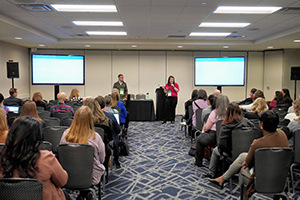
Fraud within Admissions Applications: Strategies to Combat Identity Theft
In a Monday morning session at the 109th AACRAO Annual Meeting, Rachel Poleto, Registrar, and Ronald Weist, CRM Administrator, both from Prince George's Community College, delved into the rising challenge of fraudulent admissions applications plaguing higher education institutions. The session highlighted the severity of this issue and offered practical insights into combating identity theft in admissions processes.
Identifying Fraudulent Applications
The session commenced by addressing the escalating trend of fraudulent applications, where bad actors utilize stolen personal information to submit applications for illicit gains, such as accessing federal funds or obtaining a ".edu" email address. Rachel and Ronald shared eye-opening statistics, revealing that at the height of the issue on their campus and even with a manual review, approximately one in every eight new student applications and one in every twelve new student enrollments were found to be fraudulent. These statistics underscored the widespread impact of identity theft within the admissions sphere, affecting every facet of campus operations.
Responding to Fraud: Adjusting Business Processes
In 2022, Prince George's Community College was inundated with fraudulent applications, leading to a significant strain on resources and operations. Initially, the application surge appeared promising, with admissions seemingly soaring by 900% and the school hiring new adjunct professors to accommodate. However, the reality soon became evident—many of these applications were not genuine students, and they saw classes with as few as three students actually seated.
To combat this, the college shifted its approach from minimal scrutiny to thorough manual reviews of applications. Key criteria for identifying potential fraudsters included anomalies such as atypical student ages, inconsistent high school information, and peculiar email domains, among others. Despite the efforts, the fraud detection process remained challenging, emphasizing the need for more sophisticated solutions.
Searching for Solutions: The SAFE Platform
Prince George's Community College turned to innovative technology in their quest for an effective solution. They implemented the SAFE platform—a comprehensive, real-time applicant data verification tool designed specifically for higher education. Unlike traditional methods, this platform offered a multi-variable approach, providing a confidence level percentage to admissions officers and registrars to assess the likelihood of fraud.
The college drastically reduced manual review time by integrating SAFE with its CRM system. Upon submission, the platform swiftly conducts a fraud assessment within minutes, streamlining the admissions process and allowing staff to focus on supporting genuine students rather than chasing fraudulent applications.
The Path Forward
The session concluded with a resounding message: combating identity theft requires proactive measures and innovative solutions tailored to the unique challenges faced by educational institutions. By adopting technologies like SAFE, colleges can safeguard their admissions processes and allocate resources more efficiently, ultimately ensuring that academic institutions remain sanctuaries for genuine learning and growth.
In conclusion, the session presented a compelling narrative of the evolving nature of identity fraud in admissions and highlighted the pivotal role of technology in addressing this complex issue. As we navigate the evolving landscape of higher education, let us continue to collaborate and innovate to protect the integrity of our institutions.